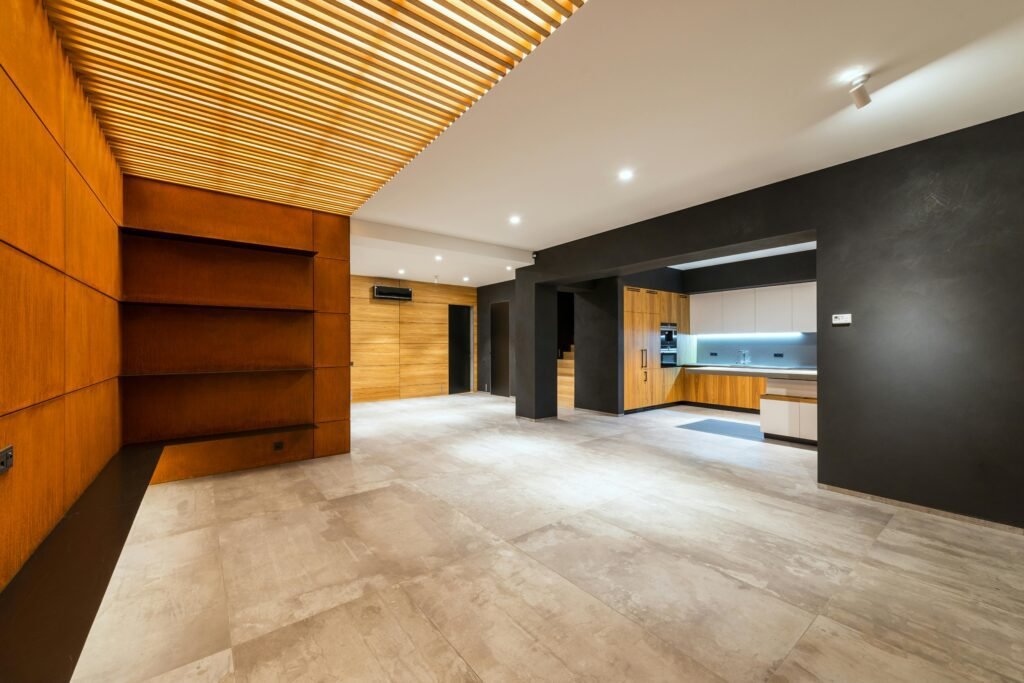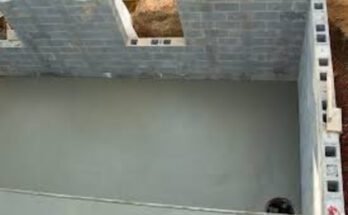Introduction: Cost to dig a basement new construction
The construction of a home is much more than just putting up walls and roofs; it is a construction of memories. One of the crucial points of this process is the support – both in the physical and more abstract sense. Although the basement might be a separate room in the house, it is much more than just that—it’s the foundation of the house of your dreams. But before you start imagining the cozy family rooms or extra storage spaces, there’s an essential question: What is the initial spend of digging a basement, especially for structures still under construction?
In this article, we’ll delve into the cost of building a new basement construction, exploring the various factors that impact the expenses and providing a detailed step-by-step guide for budgeting your basement project. This isn’t just about numbers; it’s about making strategic decisions that will shape the future of your home, ensuring that your investment adds value and comfort.”
Why Consider a Basement?
Benefits of Having a Basement
It is not just a space carved embarrassingly out of the main area of a building; it is perhaps the most important area in a home. It may be a small family room with a large couch, a home exercise space, or a vast garage that is converted into a storage center.
Yet, beyond its practicality, it is protection—a shelter in the course of storms, an additional shield, and resilience as the base constituting the framework of your living space.
Added Property Value
Thus, most areas that feature basement homes are considered to be overpriced. A completed basement will increase the value of your home in addition to what it will cost you to complete it. In its simplest form, it is not just the extra square footage – it is the potential and the option that a basement brings to a property.
Reasons that Affect the Expense incurred when digging a Basement

Soil Conditions
The land’s topology and soil on your property will, in most cases, determine the cost of digging a basement. Soil that is rocky or clayey is difficult to remove; hence, they are more expensive than sandy or loose soils. Being aware of the current terrain provides insight into things that may hinder the project or additional costs that may be incurred.
Size and Depth
The cost is also determined by the size and, in particular, the basement depth you plan on having. A bigger and deeper basement means more digging, more work to get materials to the site, and, hence, a higher cost. This is the period where the clients have to ensure that their needs and income do not clash with each other.
Excavation Method
These are the type of soil at the project site, the depth of the basement, the kind of structure to be built, the method used to dig the basement, and other conditions that the site may have. The most typical form is mechanized, and depending on the area’s accessibility and the type of ground, manual labor or specialized techniques can be used along with the machine.
Labor Costs
The cost of labor can also be said to be part of the total costs. The workload, the qualification of the employees, and the rates of the particular area will determine the costs. Skilled labor, again, should be worked at, as this can bite one back in terms of business and costs.
Permits and Regulations
Apart from the equipment costs, do not forget the costs of permits and regulations to meet. Every site is unique, and it is mandatory that your project complies with local building codes—to say the least, it is essential. The permits, therefore, cost differ depending on the project, and they usually form a significant fraction of the entire budget.
Average Costs to Dig a Basement
Regional Variations
The cost to dig a basement for new construction varies significantly based on the project’s location. Costs are also influenced by the regional site, where urban areas often face higher labor costs than rural areas.
Additionally, local demand and specific site conditions are crucial in determining the overall price of construction services. Understanding these regional variations is essential for accurate budgeting and effective planning.
Standard Costs
The average cost to excavate a basement ranges between $10,000 and $50,000, depending on factors such as difficult ground conditions and Marston-wide depths needed. This range may rise further with additional factors such as.
Additional Costs
Apart from the digging procedure, other costs must be incurred, including waterproofing, installation of a drainage system, and finishing the basement. These types of extras can add 3 or 4 thousand dollars to your total cost, but without them, comfortable and durable premises cannot be arranged.
Steps Involved in Digging a Basement

Site Preparation
However, several factors must be considered before construction begins, that is, before the first spade is turned. This involves property mapping, staking boundaries, and several checks to ensure that different utilities in the demised area are made safe or relocated. This ensures that there are no expensive setbacks and causalities on site.
Excavation Process
The excavation is the most visible part of the process. Heavy machinery digs out the earth, creating the space for your basement. This step requires precision and care to avoid damaging the surrounding structures or underground utilities.
Waterproofing and Drainage
Since the basement can be liable to water seepage, special attention should be paid to waterproofing. Without it, your basement’s fate will be that of the damp, moldy area people often associate with basements rather than a dry, utilizable space. An effective drainage system is also important to discourage the formation of water stagnation around your home’s base.
Finishing the Basement
Thus, when the basement has been excavated and made watertight, one can proceed to complete it. This falls into this category and may involve installing anything from flooring to walls and other additional features you may wish to have in your home. The total completion costs depend on your choice of finishes and the designs to be put on the surface.
Cost-Saving Tips
Choosing the Right Contractor
Selecting the right contractor is one way to make the common practice of saving the maximum amount of money viable. Hire professional basement construction contractors who have worked before in the construction industry. Ideally, with the assistance of a good contractor, one will not fall prey to such mistakes, thus avoiding blowing off the project’s cost.
Efficient Planning
Reducing costs would, therefore, require proper planning and monitoring of all the activities incurred in the business process. These entail aspects of costs, time management, and even the likely challenges before they happen. Proper planning reduces extra time and costs that are not foreseen and thus increments inefficiency.
Utilizing Local Resources
Employment of local materials and human resources leads to massive economies. Culturally sourced materials are usually cheaper in terms of transportation and time, and going local always helps save a few bucks.
Expert Insights
Quotes from Construction Experts
Construction experts agree that the cost of digging a basement can vary widely but emphasize the importance of quality over cost-cutting. “It’s crucial to invest in quality materials and skilled labor. Cutting corners can lead to long-term issues that are far more expensive to fix,” says John Doe, a seasoned construction manager.
Real-Life Case Studies
For instance, there is the story of the Smiths, who found themselves in a fix when they decided to dig a basement. Because they chose a professional contractor and were very careful with the budget, they achieved all of what was desired at a reasonable cost and even increased the worth of their house.
Future Trends in Basement Construction
Emerging Technologies
The ushering in of technological tools in construction, for instance, robotic excavation and 3D-printed floor models, are seeing feature incorporation along the basement establishment. Such technologies can decrease expenses by reducing mistakes and by working faster in the construction of houses.
Eco-Friendly Solutions
Several eco-friendly solutions should be considered when evaluating the cost of digging a basement for new construction. Incorporating green building practices, such as using sustainable materials and energy-efficient systems, not only benefits the environment but can also reduce long-term costs.
By choosing eco-friendly options, you contribute to a greener future while potentially saving money on utility bills and maintenance over time.
Conclusion
Key Takeaways
It is expensive to excavate a basement for new construction, but with a proper plan and strategy, the process is worthwhile. Understanding the costs involved, selecting a contractor, and being aware of market trends are all very important if your basement project is to be successful.
Final Thoughts
Your basement is not just another room in your house or your life but a fundamental structure that can greatly impact your home’s future. By carefully considering the cost of digging a basement for new construction and investing wisely, you’re not merely building a space but shaping the future of your home.
Strategic decisions and thoughtful planning ensure that your basement becomes a valuable addition that enhances your property’s functionality and value.
FAQs
[saswp_tiny_multiple_faq headline-0=”h3″ question-0=”What are the main factors influencing basement cost?” answer-0=”Some of the common factors are: the type of soil, size and depth of the basement, the type of excavation procedure that is going to be used, the cost of labor and whether one needs a permit to dig.” image-0=”” headline-1=”h3″ question-1=”How can I reduce costs without compromising quality?” answer-1=”Most of the efforts to minimize the costs while the quality is maintained involves the selection of the right contractor, efficient plan, and local resources. ” image-1=”” headline-2=”h3″ question-2=”Is a basement worth the investment?” answer-2=”Indeed, basement can be an asset to a house, it provides extra living space, and has numerous long-term advantages that seem to backlash the initial expense. ” image-2=”” count=”3″ html=”true”]




